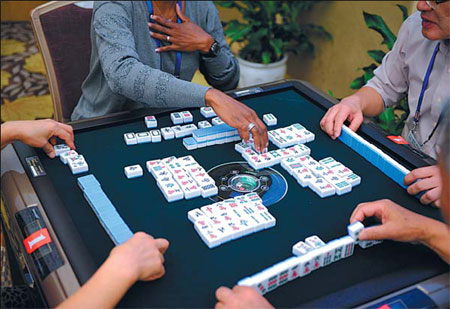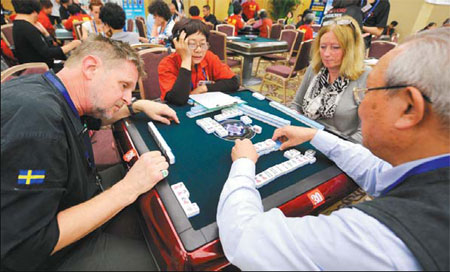

Game attracting more players overseas, Wang Huazhong reports in Qianjiang, Chongqing.
After spending most of his life working as a security guard at a State-owned factory, Liang Jianguo took on a role he never imagined.
"I never thought we would host the World Mahjong Championships or that I would travel overseas as a referee," he said.
Liang was head referee at the third World Mahjong Championships in Qianjiang, Chongqing municipality.
Saturday saw a convoy of police cars shepherding 13 buses carrying the 12 referees, including Liang, and 186 players from 13 countries to local government buildings for the championship's opening ceremony.
 |
|
The tiles and scoring rules used in mahjong may differ slightly, depending on regional variations, but the game is essentially the same in all versions. Ran Wen / for China Daily |
The 84 overseas players demonstrated their skill and exchanged strategy during the championships that also drew 102 domestic competitors.
According to World Mahjong Organization officials, a "steadily growing" number of people outside Asia are also playing the game, and mahjong associations have been organizing national- and continental-level tournaments and championships since the 1990s.
"As a healthy, scientific, friendly mind game, Mahjong will become more popular and gain wider significance," said Yu Guangyuan, the WMO chairman and a former vice-president of the Chinese Academy of Social Sciences, in his opening address.
Mahjong has a checkered history in China. Some sources claim the game was devised thousands of years ago by the sage Confucius, while others date its beginnings to the 1880s and 90s. Either way, the game - in which players attempt to collect suits of tiles, similar to Western card games such as bridge or rummy - provokes strong reactions. While devotees praise it as an intellectual pursuit, opponents vilify it as the basest form of gambling.
The perception of a game for unruly gamblers resulted in mahjong being outlawed when the People's Republic of China was founded in 1949, and it wasn't until the 1980s that it was played openly again. Even now, many view the game with suspicion and enthusiasts are sometimes embarrassed to admit their passion for fear of appearing anti-social.
Western enthusiasm
Pavel Anokhin, a computer programmer from Russia, first heard about mahjong when he read The Murder of Roger Ackroyd by the British thriller writer Agatha Christie.
The book, first published in 1926, includes a chapter An Evening at Mahjong, where the game is described as "simple entertainment, very popular in King's Abbot". The characters describe mahjong as a peaceful game, one that won't lead to acrimony with your partners, and discuss whether to shout "Chee" or "Chow" as some Chinese do when picking up discarded tiles.
Intrigued, Anokhin began playing the game himself. "I don't see much difference between mahjong and chess in terms of the level of mental difficulty. I hope more people in Russia will learn the game," said Anokhin. "By playing mahjong, we can learn more about China and its culture," he added.
Meanwhile, members of the British rock band Pink Floyd were so enamored of the game that they even called one of their songs A Pillow of Winds, a reference to a particular scoring combination.
The European Mahjong Association said more than 500 professional players compete in regular national and intra-continental tournaments, hoping to rise ever higher in the rankings.
The development of mahjong leagues across Europe inspired the associations in Denmark and the Netherlands to propose the establishment of the World Mahjong Organization. Founded in 2005, the WMO has branches in 24 countries across the Americas, Europe and Asia.
Almost all the member countries have their own leagues, and four European Mahjong Championships have been held to date. Moreover, clubs have been mushrooming in major European cities from Amsterdam to Zurich.
Desiree Heemskerk, who organized the Open European Mahjong Championship in 2005 and the Dutch Mahjong Association in 2004, said clubs and tournaments have been opening across the continent since the 1990s.
People in the Netherlands used to play by the typical Dutch rules, which was boring, but when a match was organized using Hong Kong and world competition rules, the game began to flourish, she said.
"Since then, more people have come to play because it's more official and you have a greater chance of playing against people from other countries. That makes all the difference - we don't play the Dutch rules anymore," admitted Heemskerk.
She noted that the Internet is a popular destination for many players and that European devotees can even subscribe to Mahjongnews, an independent online newspaper.
 |
|
Mahjong's appeal is going increasingly global as seen during the world championships in Chongqing. Ran Wen / for China Daily |
Europeans taking part in the World Mahjong Championship in Chongqing described the game as a fun mental exercise played simply for enjoyment. For them, gambling never enters the equation.
Joel Ratsimandresy, a French civil engineer, who took an oath on behalf of all the competitors to play the game in the correct manner, morally and in a spirit of fairness and friendship, may have understated his enthusiasm when he said he is "fond of the game". The 30-year-old plays three times a week, for five hours at a time at clubs in Paris.
Another Frenchman, physicist Quentin Porcherot, 27, said he started playing with his parents and grandparents 20 years ago. "Some Western families play mahjong. It was very fashionable 85 years ago. The Americans brought mahjong from China to the Western world, translating and adapting it to simpler rules."
"I love the game because it's relatively comprehensive. It mixes the random with strategy and psychology."